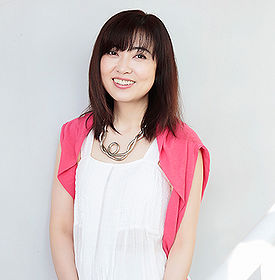Difference between revisions of "Hayashibara Megumi"
m |
m |
||
| Line 1: | Line 1: | ||
| − | [[Image:Hayashibara Megumi.jpg|thumb| | + | [[Image:Hayashibara Megumi.jpg|thumb|275px||Hayashibara Megumi]] |
<div align="justify"> | <div align="justify"> | ||
'''Hayashibara Megumi''' (林原めぐみ) is a [[J-Pop|Japanese pop]] singer-songwriter and an [[Anime|anime]] [[Seiyuu|seiyuu]]. She is signed under [[Star Child]] management and under the [[KING RECORDS]] label. Over of the course of a twenty year career, she has become one of Japan's most popular seiyuu having over 236 roles credited to her name, and she has won [[Animage]]'s most popular seiyuu award twelve times. | '''Hayashibara Megumi''' (林原めぐみ) is a [[J-Pop|Japanese pop]] singer-songwriter and an [[Anime|anime]] [[Seiyuu|seiyuu]]. She is signed under [[Star Child]] management and under the [[KING RECORDS]] label. Over of the course of a twenty year career, she has become one of Japan's most popular seiyuu having over 236 roles credited to her name, and she has won [[Animage]]'s most popular seiyuu award twelve times. | ||
| Line 17: | Line 17: | ||
== Information == | == Information == | ||
| − | [[File:Hayashibara - Pulse promo.jpg|thumb| | + | [[File:Hayashibara - Pulse promo.jpg|thumb|225px|Hayashibara promoting "[[Pulse (Hayashibara Megumi)|Pulse]]" (1990)]] |
<div align="justify"> | <div align="justify"> | ||
Hayashibara Megumi has wanted to become a [[Seiyuu|seiyuu]] since she was little. In elemetary school she became inspired by [[Ikeda Akiko]]'s role in the [[Anime|anime]] [[Galaxy Express 999]]. Right after graduating from high school Hayashibara started nursing school. While going to nursing school, Hayashibara came across an ad at a local bookstore for open audition with [[Art's Vision]] (a [[Seiyuu|seiyuu]] management company). She impressed the judges and was offered a deal. | Hayashibara Megumi has wanted to become a [[Seiyuu|seiyuu]] since she was little. In elemetary school she became inspired by [[Ikeda Akiko]]'s role in the [[Anime|anime]] [[Galaxy Express 999]]. Right after graduating from high school Hayashibara started nursing school. While going to nursing school, Hayashibara came across an ad at a local bookstore for open audition with [[Art's Vision]] (a [[Seiyuu|seiyuu]] management company). She impressed the judges and was offered a deal. | ||
| Line 27: | Line 27: | ||
With her increasing popularity, Hayashibara deciced to branch out and do more music. Her second single, "[[Pulse (Hayashibara Megumi)|Pulse]]" was released in 1990 under the [[Futureland]]record label. The single was a flop, only peaking at #92 on the [[Oricon]] chart. Hayashibara then left the label and signed with [[KING RECORDS]]. March of 1991, she released her fourth single "[[Nijiiro no Sneaker]]" and her debut album, "[[Half and, Half]]" with her new record label. | With her increasing popularity, Hayashibara deciced to branch out and do more music. Her second single, "[[Pulse (Hayashibara Megumi)|Pulse]]" was released in 1990 under the [[Futureland]]record label. The single was a flop, only peaking at #92 on the [[Oricon]] chart. Hayashibara then left the label and signed with [[KING RECORDS]]. March of 1991, she released her fourth single "[[Nijiiro no Sneaker]]" and her debut album, "[[Half and, Half]]" with her new record label. | ||
| − | [[Image:Hayashibara - Sham promo.jpg|thumb| | + | [[Image:Hayashibara - Sham promo.jpg|thumb|225px|left|Hayashibara promoting "[[Shamrock (Hayashibara Megumi)|SHAMROCK]]" (1993)]] |
Over the next couple years between her voice roles and solo music, Hayashibara joined some idol groups. In 1991, she joined two groups which were made of the female seiyuu from [[Ranma 1/2|Ranma ½]]. [[DoCo]], which was made up of her, [[Inoue Kikuko]] (井上喜久子), [[Hidaka Noriko]] (日高のり子), [[Takayama Minami]] (高山みなみ), and [[Sakuma Rei]] (佐久間レイ). The second group was called [[Ties]], which was only made up of her, [[Hidaka Noriko]] (日高のり子), and [[Sakuma Rei]] (佐久間レイ). | Over the next couple years between her voice roles and solo music, Hayashibara joined some idol groups. In 1991, she joined two groups which were made of the female seiyuu from [[Ranma 1/2|Ranma ½]]. [[DoCo]], which was made up of her, [[Inoue Kikuko]] (井上喜久子), [[Hidaka Noriko]] (日高のり子), [[Takayama Minami]] (高山みなみ), and [[Sakuma Rei]] (佐久間レイ). The second group was called [[Ties]], which was only made up of her, [[Hidaka Noriko]] (日高のり子), and [[Sakuma Rei]] (佐久間レイ). | ||
| Line 33: | Line 33: | ||
In 1992, Hayashibara started off the year with the release of her second album, "[[Whatever (Hayashibara Megumi)|WHATEVER]]" which reached #18 on the [[Oricon]] chart. Later that year she voiced '''Natsume Atsuko''' in the [[OVA]] adaption of [[Takada Yuzo]]'s [[All Purpose Cultural Cat Girl Nuku Nuku]]; she had previously voiced the main character in the [[OAV]] for Takada's series, [[3x3 Eyes]]. Not only did she voiced the main character of Nuku Nuku, but she was asked to performed the opening and ending theme songs. This role lead Hayashibara to the release of more popular singles: "[[Haruneko Fushigi Tsukiyo -Oshiete Happiness-]]" (peaking at #49) and "[[Yume Hurry Up]]" (peaking at #58). | In 1992, Hayashibara started off the year with the release of her second album, "[[Whatever (Hayashibara Megumi)|WHATEVER]]" which reached #18 on the [[Oricon]] chart. Later that year she voiced '''Natsume Atsuko''' in the [[OVA]] adaption of [[Takada Yuzo]]'s [[All Purpose Cultural Cat Girl Nuku Nuku]]; she had previously voiced the main character in the [[OAV]] for Takada's series, [[3x3 Eyes]]. Not only did she voiced the main character of Nuku Nuku, but she was asked to performed the opening and ending theme songs. This role lead Hayashibara to the release of more popular singles: "[[Haruneko Fushigi Tsukiyo -Oshiete Happiness-]]" (peaking at #49) and "[[Yume Hurry Up]]" (peaking at #58). | ||
| − | [[Image:Hayashibara_infinity_promo.jpg|thumb| | + | [[Image:Hayashibara_infinity_promo.jpg|thumb|225px|Hayashibara promoting "[[~Infinity~|~infinity~∞]]" (1998)]] |
Hayashibara was then again asked if she would like to work on [[Takada Yuzo]]'s next project, [[Blue Seed]]. She agreed and voiced the main character '''Fujimiya Momiji''', and sang the ending theme song. She released a single for the song, "[[Touch and Go!!]]" which peaked on the [[Oricon]] at #37. | Hayashibara was then again asked if she would like to work on [[Takada Yuzo]]'s next project, [[Blue Seed]]. She agreed and voiced the main character '''Fujimiya Momiji''', and sang the ending theme song. She released a single for the song, "[[Touch and Go!!]]" which peaked on the [[Oricon]] at #37. | ||
| Line 43: | Line 43: | ||
After the end of [[Slayers]] Hayashibara was once again offered several leading roles. In 1998 she went on to be the lead in the [[Anime|anime]] [[Lost Universe]] (which was from the author of Slayers). Later that year she once again played the voice of Takada Yuzo's character '''Natsume Atsuko''' in the series [[All Purpose Cultural Cat Girl Nuku Nuku DASH!]]. Once again she sang the opening and ending themes and released them as the single, "[[A House Cat|A HOUSE CAT]]", which reached #6 on the [[Oricon]] chart. | After the end of [[Slayers]] Hayashibara was once again offered several leading roles. In 1998 she went on to be the lead in the [[Anime|anime]] [[Lost Universe]] (which was from the author of Slayers). Later that year she once again played the voice of Takada Yuzo's character '''Natsume Atsuko''' in the series [[All Purpose Cultural Cat Girl Nuku Nuku DASH!]]. Once again she sang the opening and ending themes and released them as the single, "[[A House Cat|A HOUSE CAT]]", which reached #6 on the [[Oricon]] chart. | ||
| − | [[File:Hayashibara - Over.jpg|thumb| | + | [[File:Hayashibara - Over.jpg|thumb|225px|left|Hayashibara promoting "[[Over Soul]]" (2001)]] |
Hayashibara was married on 1998.05.30. She first entered her name into the family registry of a fellow company employee on April 1st. She had stated that the two had been dating for the last five years. On the wedding day at Toshima Hall in Tokyo, there was a public recording of Hayashibara's ''Tokyo Boogie Night'' radio show. | Hayashibara was married on 1998.05.30. She first entered her name into the family registry of a fellow company employee on April 1st. She had stated that the two had been dating for the last five years. On the wedding day at Toshima Hall in Tokyo, there was a public recording of Hayashibara's ''Tokyo Boogie Night'' radio show. | ||
| Line 55: | Line 55: | ||
On January 10th 2004, Hayashibara announced that she was pregnant with her first child on her radio show. | On January 10th 2004, Hayashibara announced that she was pregnant with her first child on her radio show. | ||
| − | [[File:Hayashibara - Meet.jpg|thumb| | + | [[File:Hayashibara - Meet.jpg|thumb|225px|Hayashibara promoting "[[Meet Again|Meet again]]" (2006)]] |
As of 2006, it seems Hayashibara has slowing been working towards a comeback. That year she released the single "[[Meet Again|Meet again]]" and followed up in 2007 with the single "[[A Happy Life]]", which was the lead-in single for her twelfth album, "[[Plain]]". | As of 2006, it seems Hayashibara has slowing been working towards a comeback. That year she released the single "[[Meet Again|Meet again]]" and followed up in 2007 with the single "[[A Happy Life]]", which was the lead-in single for her twelfth album, "[[Plain]]". | ||
| Line 152: | Line 152: | ||
=== Compilation / Other === | === Compilation / Other === | ||
*[1989.11.21] [[Chinpui]] (チンプイ) (#2 ''Cinderella Nanka ni Naritakunai'' - <small>'''Hayashibara Megumi and''' [[Sato Sayuri]]</small>) | *[1989.11.21] [[Chinpui]] (チンプイ) (#2 ''Cinderella Nanka ni Naritakunai'' - <small>'''Hayashibara Megumi and''' [[Sato Sayuri]]</small>) | ||
| − | |||
*[1990.11.25] [[Seiyuu Graffiti]] (#16 ''HI.MI.KO'') | *[1990.11.25] [[Seiyuu Graffiti]] (#16 ''HI.MI.KO'') | ||
*[1990.12.05] [[Abunai Doyoubi]] (#1 ''Abunai Doyoubi'' - <small>[[Tomizawa Michie]], [[Mizutani Yuko]], '''and Hayashibara Megumi'''</small>) | *[1990.12.05] [[Abunai Doyoubi]] (#1 ''Abunai Doyoubi'' - <small>[[Tomizawa Michie]], [[Mizutani Yuko]], '''and Hayashibara Megumi'''</small>) | ||
*[1991.01.21] [[Characters' Christmas]] (#1 ''Characters' Christmas'' - <small>'''Ranma Opera Troupe'''</small>, #3 ''Jusenkyou-bata Kaigiroku Sono 12'' - <small>'''Ranma Cast'''</small>) | *[1991.01.21] [[Characters' Christmas]] (#1 ''Characters' Christmas'' - <small>'''Ranma Opera Troupe'''</small>, #3 ''Jusenkyou-bata Kaigiroku Sono 12'' - <small>'''Ranma Cast'''</small>) | ||
*[1991.01.21] [[Miwaku no Limbo Dance]] (#1 ''Miwaku no Limbo Dance'' - <small>'''Ranma Opera Troupe'''</small>) | *[1991.01.21] [[Miwaku no Limbo Dance]] (#1 ''Miwaku no Limbo Dance'' - <small>'''Ranma Opera Troupe'''</small>) | ||
| − | |||
*[1991.01.21] [[Otousan]] (#2 ''China Kara no Tegami'' - <small>'''Hayashibara Megumi and''' [[Yamaguchi Kappei]]</small>) | *[1991.01.21] [[Otousan]] (#2 ''China Kara no Tegami'' - <small>'''Hayashibara Megumi and''' [[Yamaguchi Kappei]]</small>) | ||
*[1991.07.25] [[Adesugata Nagisa Musume]] (#1 ''Adesugata Nagisa Musume'' - <small>'''Hayashibara Megumi''', Tanka Mayumi, Tamagawa Sakiko</small>) | *[1991.07.25] [[Adesugata Nagisa Musume]] (#1 ''Adesugata Nagisa Musume'' - <small>'''Hayashibara Megumi''', Tanka Mayumi, Tamagawa Sakiko</small>) | ||
| Line 168: | Line 166: | ||
*[1993.04.28] [[Bokutachi Kara Arigato]] (#1 ''Bokutachi Kara Arigato'' - <small>'''Zettai Muteki Raijinoh Cast'''</small>) | *[1993.04.28] [[Bokutachi Kara Arigato]] (#1 ''Bokutachi Kara Arigato'' - <small>'''Zettai Muteki Raijinoh Cast'''</small>) | ||
*[1993.06.23] [[Nekomusume Sound Phase V|Nekomusume SOUND PHASE V]] (#''ROCK de Ikou'' (ROCK で行こう) - <small>[[Shimatsu Saeko]] and '''Hayashibara Megumi'''</small>, #9 ''Dare mo Shiranai Mirai wo Dakishimete (誰も知らない未来を抱きしめて)) | *[1993.06.23] [[Nekomusume Sound Phase V|Nekomusume SOUND PHASE V]] (#''ROCK de Ikou'' (ROCK で行こう) - <small>[[Shimatsu Saeko]] and '''Hayashibara Megumi'''</small>, #9 ''Dare mo Shiranai Mirai wo Dakishimete (誰も知らない未来を抱きしめて)) | ||
| − | *[1993.06.23] | + | *[1993.06.23] '''Hayashibara Megumi''', [[Mizutani Yuko]], [[Tamagawa Sakiko]], and [[Orikasa Ai]] - "[[Yozora no Hoshi ga Miteiru]]" |
| − | |||
*[1993.09.22] [[Nekomusume Sound Phase VI|Nekomusume SOUND PHASE VI]] (#1 ''Watashi ni Happy Birthday [OVA Size]'' (私にハッピーバースデイ), #7 ''Kokoro no Plantium [NUKU NUKU Version]'' (心のプラネット)) | *[1993.09.22] [[Nekomusume Sound Phase VI|Nekomusume SOUND PHASE VI]] (#1 ''Watashi ni Happy Birthday [OVA Size]'' (私にハッピーバースデイ), #7 ''Kokoro no Plantium [NUKU NUKU Version]'' (心のプラネット)) | ||
*[1993.10.06] [[Ranma to Akane no Ballad]] (らんまとあかねのBallad; ''Ranma and Akane's Ballad'') (Character Single) | *[1993.10.06] [[Ranma to Akane no Ballad]] (らんまとあかねのBallad; ''Ranma and Akane's Ballad'') (Character Single) | ||
| − | |||
*[1994.05.25] [[Minky Momo Tabidachi no Eki]] (ミンキーモモ 旅だちの駅) (#1 ''Forever Dreamer'', #17 ''Bon Voyage!'') | *[1994.05.25] [[Minky Momo Tabidachi no Eki]] (ミンキーモモ 旅だちの駅) (#1 ''Forever Dreamer'', #17 ''Bon Voyage!'') | ||
*[1994.11.03] [[Carbival Babel|CARNIVAL BABEL]] (#2 ''Touch and Go!!'') | *[1994.11.03] [[Carbival Babel|CARNIVAL BABEL]] (#2 ''Touch and Go!!'') | ||
| Line 181: | Line 177: | ||
*[1995.01.21] [[Elles Cinq III: Love Drug]] (Drama CD) | *[1995.01.21] [[Elles Cinq III: Love Drug]] (Drama CD) | ||
*[1995.01.21] [[Elles Cinq IV: Tears no Kataomoi]] (Drama CD) | *[1995.01.21] [[Elles Cinq IV: Tears no Kataomoi]] (Drama CD) | ||
| − | |||
*[1995.03.03] [[Blue Seed Onegakuhen Vol.2]] (#14 ''Hoshi wo Tobikoete'' (星を飛び越えて) - <small>'''Hayashibara Megumi''' and [[Tamagawa Sakiko]]</small>) | *[1995.03.03] [[Blue Seed Onegakuhen Vol.2]] (#14 ''Hoshi wo Tobikoete'' (星を飛び越えて) - <small>'''Hayashibara Megumi''' and [[Tamagawa Sakiko]]</small>) | ||
| − | |||
*[1995.04.29] [[Yousei Yori Ai wo Komete 2]] (Drama CD) | *[1995.04.29] [[Yousei Yori Ai wo Komete 2]] (Drama CD) | ||
*[1995.04.29] [[Yousei Yori Ai wo Komete 3]] (Drama CD) | *[1995.04.29] [[Yousei Yori Ai wo Komete 3]] (Drama CD) | ||
| Line 194: | Line 188: | ||
*[1996.02.16] [[Neon Genesis Evangelion II]] (#21 ''FLY ME TO THE MOON [Rei (#5) TV Size Remix Version]'', #22 ''FLY ME TO THE MOON [Rei (#6) TV Size Remix Version]'') | *[1996.02.16] [[Neon Genesis Evangelion II]] (#21 ''FLY ME TO THE MOON [Rei (#5) TV Size Remix Version]'', #22 ''FLY ME TO THE MOON [Rei (#6) TV Size Remix Version]'') | ||
*[1996.05.22] [[Neon Genesis Evangelion III]] (#31 ''FLY ME TO THE MOON [Rei #23 TV. Size Version]'', #32 ''FLY ME TO THE MOON [Rei #25 TV. Size Version]'', #33 ''FLY ME TO THE MOON [Rei #26 TV. Size Version]'') | *[1996.05.22] [[Neon Genesis Evangelion III]] (#31 ''FLY ME TO THE MOON [Rei #23 TV. Size Version]'', #32 ''FLY ME TO THE MOON [Rei #25 TV. Size Version]'', #33 ''FLY ME TO THE MOON [Rei #26 TV. Size Version]'') | ||
| − | *[1996.06.21] | + | *[1996.06.21] '''Hayashibara Megumi''', [[Nagashima Yuuko]], [[Shiina Hekiru]], [[Hidaka Noriko]] - "[[All the SHO-COMI World]]" |
*[1996.11.21] [[Shoot! Love Hunter|SHOOT! LOVE HUNTER]] (#2 ''Whip on Darling'' - <small>'''Hayashibara Megumi''' and [[Mizutani Yuko]]</small>) | *[1996.11.21] [[Shoot! Love Hunter|SHOOT! LOVE HUNTER]] (#2 ''Whip on Darling'' - <small>'''Hayashibara Megumi''' and [[Mizutani Yuko]]</small>) | ||
| − | *[1996.12.21] [[Neon Genesis Evangelion Addition]] (#1 ''Zankoku na Tenshi no Teeze'' (残酷な天使のテーゼ), #9 ''FLY ME TO THE MOON -Main Version II-'' - both by <small>[[Mitsuishi Kotono]], '''Hayashibara Megumi''', [[Miyamura Yuko]]</small>) | + | *[1996.12.21] [[Neon Genesis Evangelion Addition]] (#1 ''Zankoku na Tenshi no Teeze'' (残酷な天使のテーゼ), #9 ''FLY ME TO THE MOON -Main Version II-'' - both by <small> [[Mitsuishi Kotono]], '''Hayashibara Megumi''', [[Miyamura Yuko]]</small>) |
| − | *[ | + | *[1997.04.09] [[Bakuretsu Hunter Deluxe Album]] |
*[1997.xx.xx] [[Rocket Dan yo Eien ni]] (#1 ''Rocket Dan yo Eien ni'' - <small>'''Hayashibara Megumi''', [[Miki Shinichirou]], [[Inuyama Inuko]]</small>) | *[1997.xx.xx] [[Rocket Dan yo Eien ni]] (#1 ''Rocket Dan yo Eien ni'' - <small>'''Hayashibara Megumi''', [[Miki Shinichirou]], [[Inuyama Inuko]]</small>) | ||
*[1998.07.03] [[Lost Universe Tracks Contents 1]] (#2 ''infinity~ ∞'', #23 ''EXTRICATION (TV Size)'', #24 ''~infinity~∞ (TV Size)'', #41 ''EXTRICATION'') | *[1998.07.03] [[Lost Universe Tracks Contents 1]] (#2 ''infinity~ ∞'', #23 ''EXTRICATION (TV Size)'', #24 ''~infinity~∞ (TV Size)'', #41 ''EXTRICATION'') | ||
| Line 208: | Line 202: | ||
*[1999.11.20] [[Sanrio Puroland Original CD Vol. 5 Sanrio Character Boat Ride]] (#1 ''Hoshizora no Party -We're in Your Heart-'') | *[1999.11.20] [[Sanrio Puroland Original CD Vol. 5 Sanrio Character Boat Ride]] (#1 ''Hoshizora no Party -We're in Your Heart-'') | ||
*[2000.03.18] [[Ashita ni Nattara...]] (明日になったら…) | *[2000.03.18] [[Ashita ni Nattara...]] (明日になったら…) | ||
| − | |||
*[2001.xx.xx] [[Maemuki Rocket-dan]] (#1 ''Maemuki Rocket-dan'' - <small>'''Team Rocket'''</small>) | *[2001.xx.xx] [[Maemuki Rocket-dan]] (#1 ''Maemuki Rocket-dan'' - <small>'''Team Rocket'''</small>) | ||
*[2002.06.12] [[Koishichai na Town]] (恋しちゃいなタウン) | *[2002.06.12] [[Koishichai na Town]] (恋しちゃいなタウン) | ||
Revision as of 04:40, 25 May 2009
Hayashibara Megumi (林原めぐみ) is a Japanese pop singer-songwriter and an anime seiyuu. She is signed under Star Child management and under the KING RECORDS label. Over of the course of a twenty year career, she has become one of Japan's most popular seiyuu having over 236 roles credited to her name, and she has won Animage's most popular seiyuu award twelve times.
Contents
Profile
- Name: Hayashibara Megumi (林原めぐみ)
- Birth date: March 30th, 1967
- Birth place: Tokyo, Japan
- Blood Type: O
- Height: 155cm
- Weight: 45kg
- Sizes: B80 : W59 : H85 (cm)
- Shoe Size: 23cm
- Least Favorite Food: Fried Liver
- Favorite Animals: Dogs, Sharks, Dolphins, etc.
- Hobbies: Collecting telephone cards
Information
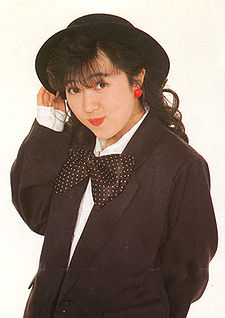
Hayashibara Megumi has wanted to become a seiyuu since she was little. In elemetary school she became inspired by Ikeda Akiko's role in the anime Galaxy Express 999. Right after graduating from high school Hayashibara started nursing school. While going to nursing school, Hayashibara came across an ad at a local bookstore for open audition with Art's Vision (a seiyuu management company). She impressed the judges and was offered a deal.
In 1986, Hayashibara Megumi started her voice acting training at Arts Vision's acting school and talent agency. Durning this time she was still studying to be a registered nurse, her original career choice. Her debut as a seiyuu was in the anime adaption to Takahashi Rumiko's Maison Ikkoku, where she played a number of minor character roles.
Over the next couple years, Hayashibara continued to only play minor roles in anime. Her first major role wasn't until 1989's Mobile Suit Gundam 0080: War in the Pocket, where she voiced pilot Christina 'Chris' MacKenzie. It was during this role that Hayashibara sang her first song, "Yoake no Shooting Star" (which was later released on her "WHATEVER" album). Later that year she did one of her most popular roles as the female version of Saotome Ranma in Takahashi Rumiko's Ranma ½. After this she was offered more leading roles, with her next being Alfred in Alfred J. Kwak. Not only did she voiced the main character she also sang the opening and closing theme songs which were released on her debut single, "Yakusoku da yo".
With her increasing popularity, Hayashibara deciced to branch out and do more music. Her second single, "Pulse" was released in 1990 under the Futurelandrecord label. The single was a flop, only peaking at #92 on the Oricon chart. Hayashibara then left the label and signed with KING RECORDS. March of 1991, she released her fourth single "Nijiiro no Sneaker" and her debut album, "Half and, Half" with her new record label.
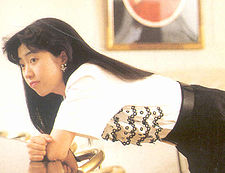
Over the next couple years between her voice roles and solo music, Hayashibara joined some idol groups. In 1991, she joined two groups which were made of the female seiyuu from Ranma ½. DoCo, which was made up of her, Inoue Kikuko (井上喜久子), Hidaka Noriko (日高のり子), Takayama Minami (高山みなみ), and Sakuma Rei (佐久間レイ). The second group was called Ties, which was only made up of her, Hidaka Noriko (日高のり子), and Sakuma Rei (佐久間レイ).
In 1992, Hayashibara started off the year with the release of her second album, "WHATEVER" which reached #18 on the Oricon chart. Later that year she voiced Natsume Atsuko in the OVA adaption of Takada Yuzo's All Purpose Cultural Cat Girl Nuku Nuku; she had previously voiced the main character in the OAV for Takada's series, 3x3 Eyes. Not only did she voiced the main character of Nuku Nuku, but she was asked to performed the opening and ending theme songs. This role lead Hayashibara to the release of more popular singles: "Haruneko Fushigi Tsukiyo -Oshiete Happiness-" (peaking at #49) and "Yume Hurry Up" (peaking at #58).
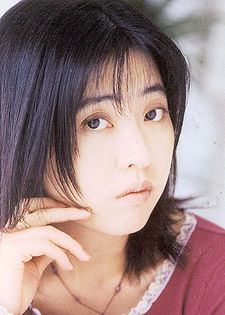
Hayashibara was then again asked if she would like to work on Takada Yuzo's next project, Blue Seed. She agreed and voiced the main character Fujimiya Momiji, and sang the ending theme song. She released a single for the song, "Touch and Go!!" which peaked on the Oricon at #37.
In 1995, Hayashibara's singing career was beginning to pick up even more. It was that year that she started voicing one of her most famous roles: Lina Inverse of Slayers. Once again she performed both opening and closing themes and she performed the first seasons themes as duets with friend and label-mate, Okui Masami. Slayers became extremely popular, and the television series alone lasted for three season (all of which Hayashibara contributed theme songs for). She released a number of Slayers related singles all of which seemed to get more popular as time went on: "Get Along", "MIDNIGHT BLUE", "Going History", "Give a Reason", "Kagirinai Yokubou no Naka ni", "Just be conscious", "don't be discouraged", "Reflection", and "raging waves".
Not long after the start of Slayers, Hayashibara was offered another major role. She was offered the role of Lime in Akahori Satoru's Saber Marionette J (she had previously contributed in the anime adaption of his series Sorcerer Hunters). This series became another long running role, and the anime lasted two seasons and released a short OVA, all which Hayashibara sang the themes for.
After the end of Slayers Hayashibara was once again offered several leading roles. In 1998 she went on to be the lead in the anime Lost Universe (which was from the author of Slayers). Later that year she once again played the voice of Takada Yuzo's character Natsume Atsuko in the series All Purpose Cultural Cat Girl Nuku Nuku DASH!. Once again she sang the opening and ending themes and released them as the single, "A HOUSE CAT", which reached #6 on the Oricon chart.
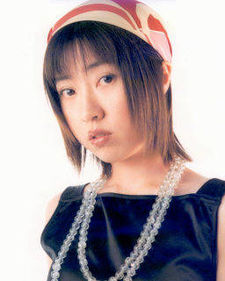
Hayashibara was married on 1998.05.30. She first entered her name into the family registry of a fellow company employee on April 1st. She had stated that the two had been dating for the last five years. On the wedding day at Toshima Hall in Tokyo, there was a public recording of Hayashibara's Tokyo Boogie Night radio show.
In 2000, Hayashibara voiced Urashima Haruka from Love Hina. Even though she wasn't voicing the role of the lead character, she still sang the theme song. "Sakura Saku", the theme song, was released on 2000.05.24 and reached #7 on the Oricon chart.
It was in 2001 that Hayashibara took part in another long running series. She was offered a role in the anime adaption of the Weekly Jump manga, Shaman King. In the series she voiced the main character's love interest, Kyoyama Anna. She sang all of the theme songs for the series and released them on three singles: "Over Soul", "feel weel", and "brave heart".
After this point Hayashibara started working less. In 2003 she only released two singles and a year later she released her eleventh album, "center color". After this Hayashibara didn't release any solo material for two years.
On January 10th 2004, Hayashibara announced that she was pregnant with her first child on her radio show.
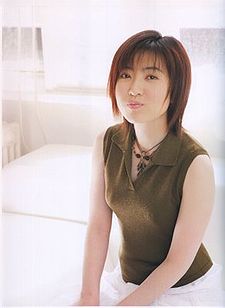
As of 2006, it seems Hayashibara has slowing been working towards a comeback. That year she released the single "Meet again" and followed up in 2007 with the single "A Happy Life", which was the lead-in single for her twelfth album, "Plain".
On July 2nd 2008, Hayashibara returned to playing her famous role as Lina Inverse on the new Slayes series, Slayers Revolution. She followed with the single "Plenty of grit / Revolution", just a few months later. The series did so well that it was renewed for a second season, Slayers Evolution-R, which aired during the first quater of 2009. She once again released the theme songs for the series on a single entitled, "Front breaking / Sunadokei".
Hayashibara has been active in the recent Shin Seiki Evangelion works. She sang the song "Shuuketsu no Sono e", which was used as the theme to the 'CR New Age Evangelion pachinko machine. This single also marks the first time since 2003 that Hayashibara has released two singles during the same year.
Trivia
- Hayashibara Megumi is a certified Registered Nurse. She trained to be a nurse during the same time which she trained to be a seiyuu.
- At an event at which Hayashibara was the main guest, she used her nurse's training when a man who also attended became ill. She was the only one in the room with a medical background.
- She has said that after voice acting she might open up an aroma therapy store.
- Hayashibara has voiced a character in almost every Takahashi Rumiko and Takada Yuzo based-anime. Takada even drew the cover to her first best-of album, "VINTAGE S".
- Hayashibara has sung every theme song for all of the Slayers series including TV series, movies, OAVs, and video games.
- Hayashibara was one of the leading artists which created the third seiyuu wave.
Discography
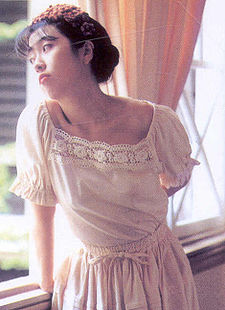
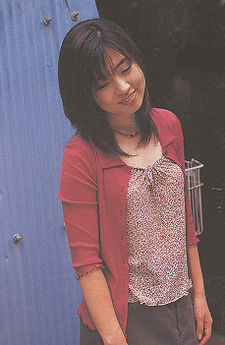
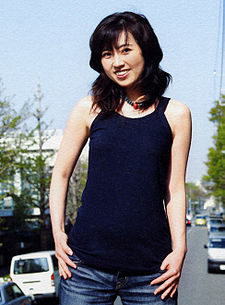
Albums
- [1991.03.21] Half and, Half
- [1992.03.05] WHATEVER
- [1992.08.05] Perfume
- [1993.08.21] SHAMROCK
- [1994.07.02] SPHERE
- [1995.03.03] Enfleurage
- [1996.11.01] Bertemu (ブルトゥム)
- [1997.08.06] Iravati
- [1999.10.27] Fuwari (ふわり)
- [2002.06.26] feel well
- [2004.01.07] center color
- [2007.04.21] Plain
Other Albums
- [1993.03.05] Minky Momo Love Stage (魔法のプリンセス ミンキーモモ) (character album)
- [2000.04.26] VINTAGE S (best album)
- [2000.06.21] VINTAGE A (best album)
- [2001.03.20] Evangelion the Birthday of Rei Ayanami (character album)
- [2007.04.21] Hayashibara Megumi Tanoshii Douyou (林原めぐみ たのしいどうよう)
- [2008.06.25] Slayers MEGUMIX (スレイヤーズ MEGUMIX) (slayers best album)
Singles
- [1989.05.25] Yakusoku da yo (約束だよ; It Is a Promise)
- [1990.02.28] PULSE
- [1991.01.21] November Rain
- [1991.03.05] Nijiiro no Sneaker (虹色のSneaker; Rainbow-coloured Sneaker)
- [1991.04.25] Nijiiro Renai★ (虹色れんあい★; Rainbow-coloured Love)
- [1992.06.24] Yume wo Dakishimete (夢を抱きしめて; Holding a Dream)
- [1992.08.05] Haruneko Fushigi Tsukiyo -Oshiete Happiness- (春猫不思議月夜 -おしえてHappiness-; The Spring Cat Teaches In the Mysterious Moonlight)
- [1992.xx.xx] Sousei e no Antou Naraou (創世への暗闘; Secret Strife to World Creation)
- [1993.03.24] OUR GOOD DAY...Bokura no GOOD DAY (OUR GOOD DAY…僕らのGOOD DAY; Our Good Day... My Good Day)
- [1993.05.21] Lullaby Agetai (ララバイ☆あ・げ・た・い; I Want to Give a Lullaby) (with Mitsuishi Kotono)
- [1993.11.26] Yume Hurry Up (夢 Hurry Up; Dream Hurry Up)
- [1994.05.25] Until Strawberry Sherbet
- [1994.11.03] Touch and Go!!
- [1995.01.21] Elles Cinq IV: Nostalgic Lover
- [1995.04.29] Yousei Yori Ai wo Komete 1 (妖精より愛をこめて1; From the Fairy with Love)
- [1995.05.24] Get Along (with Okui Masami)
- [1995.07.21] MIDNIGHT BLUE
- [1995.11.03] WHAT'S UP GUYS? (with Furumoto Shinnosuke)
- [1995.12.06] Going History
- [1996.04.24] Give a Reason (split with Okui Masami)
- [1996.05.22] Kagirinai Yokubou no Naka ni (限りない欲望の中に; To Unlimited Desires)
- [1996.07.07] Just be conscious
- [1996.08.21] Alchemy of Love ~Ai no Renkinjyou~ (Alchemy of Love ~愛の錬金術~; Alchemy of Love)
- [1996.10.23] Successful Mission
- [1997.04.23] don't be discouraged
- [1997.07.03] Reflection
- [1998.02.04] Fine colorday
- [1998.04.24] ~infinity~∞
- [1998.05.21] RAINBOW 5
- [1998.07.03] raging waves
- [1998.07.23] Akogare (あこがれ; Yearning)
- [1998.09.04] A HOUSE CAT
- [1998.10.23] Proof of Myself
- [1999.05.28] question at me
- [1999.12.03] Booska! Booska!! (ブースカ!ブースカ!!)
- [2000.05.24] Sakura Saku (サクラサク; Cherry Saku)
- [2000.10.25] unsteady
- [2001.08.29] Over Soul
- [2001.12.05] feel weel
- [2002.12.29] brave heart
- [2002.03.27] Northern lights
- [2002.04.24] Treat of Goblins
- [2002.09.25] KOIBUMI
- [2003.09.26] CARNIVAL・BABEL・REVIVAL (カルナバル・バベル・リバイバル)
- [2003.09.26] Makenaide, Makenaide... (負けないで、負けないで…; Without Being Defeated, Without Being Defeated…)
- [2006.07.26] Meet again
- [2007.02.07] A Happy Life
- [2008.07.23] Plenty of grit / Revolution
- [2009.02.04] Front breaking / Sunadokei (砂時計; Hourglass)
- [2009.04.22] Shuuketsu no Sono e (集結の園へ; To the Garden of Concentration)
Compilation / Other
- [1989.11.21] Chinpui (チンプイ) (#2 Cinderella Nanka ni Naritakunai - Hayashibara Megumi and Sato Sayuri)
- [1990.11.25] Seiyuu Graffiti (#16 HI.MI.KO)
- [1990.12.05] Abunai Doyoubi (#1 Abunai Doyoubi - Tomizawa Michie, Mizutani Yuko, and Hayashibara Megumi)
- [1991.01.21] Characters' Christmas (#1 Characters' Christmas - Ranma Opera Troupe, #3 Jusenkyou-bata Kaigiroku Sono 12 - Ranma Cast)
- [1991.01.21] Miwaku no Limbo Dance (#1 Miwaku no Limbo Dance - Ranma Opera Troupe)
- [1991.01.21] Otousan (#2 China Kara no Tegami - Hayashibara Megumi and Yamaguchi Kappei)
- [1991.07.25] Adesugata Nagisa Musume (#1 Adesugata Nagisa Musume - Hayashibara Megumi, Tanka Mayumi, Tamagawa Sakiko)
- [1992.08.13] Zettai Muteki Raijinoh IV (#3 Hanakotoba ni Yurete, #4 "Chikyuu Boueigumi no Hanran" Dai 4 Hanashi "Gakkyuu Kaigi" - Zettai Muteki Raijinoh Cast)
- [1992.09.26] Nekomusume SOUND PHASE 0I (#1 Watashi ni Happy Birthday (私にハッピーバースデイ))
- [1992.10.28] 92 Seiyuu Graffiti (Disc2 #14 Nemuno Oyama (ねむのおやま))
- [1992.11.21] Nekomusume SOUND PHASE 0II (#1 COMET rendez-vous, #10 My dear)
- [1993.02.05] Nekomusume SOUND PHASE 0III (#1 Ganbatte! (がんばって!))
- [1993.04.21] Nekomusume SOUND PHASE IV (#12 Touch Me Softly, #16 Haru Neko Fushigi Tsukiyo -Oshiete Happiness- (春猫不思議月夜 ―おしえて Happiness―))
- [1993.04.28] Bokutachi Kara Arigato (#1 Bokutachi Kara Arigato - Zettai Muteki Raijinoh Cast)
- [1993.06.23] Nekomusume SOUND PHASE V (#ROCK de Ikou (ROCK で行こう) - Shimatsu Saeko and Hayashibara Megumi, #9 Dare mo Shiranai Mirai wo Dakishimete (誰も知らない未来を抱きしめて))
- [1993.06.23] Hayashibara Megumi, Mizutani Yuko, Tamagawa Sakiko, and Orikasa Ai - "Yozora no Hoshi ga Miteiru"
- [1993.09.22] Nekomusume SOUND PHASE VI (#1 Watashi ni Happy Birthday [OVA Size] (私にハッピーバースデイ), #7 Kokoro no Plantium [NUKU NUKU Version] (心のプラネット))
- [1993.10.06] Ranma to Akane no Ballad (らんまとあかねのBallad; Ranma and Akane's Ballad) (Character Single)
- [1994.05.25] Minky Momo Tabidachi no Eki (ミンキーモモ 旅だちの駅) (#1 Forever Dreamer, #17 Bon Voyage!)
- [1994.11.03] CARNIVAL BABEL (#2 Touch and Go!!)
- [1994.11.23] 94 Seiyuu Song Festival (#1 Soujou Rakuen (騒擾楽園))
- [1994.12.16] Blue Seed Onegakuhen Vol.1 (#21 Touch and Go!!)
- [1994.12.xx] LUNAR -ETERNAL BLUE- PREMIUM CD (#2 Okane ga Ichiban)
- [1995.01.21] Elles Cinq II: Tiny Heart (Drama CD)
- [1995.01.21] Elles Cinq III: Love Drug (Drama CD)
- [1995.01.21] Elles Cinq IV: Tears no Kataomoi (Drama CD)
- [1995.03.03] Blue Seed Onegakuhen Vol.2 (#14 Hoshi wo Tobikoete (星を飛び越えて) - Hayashibara Megumi and Tamagawa Sakiko)
- [1995.04.29] Yousei Yori Ai wo Komete 2 (Drama CD)
- [1995.04.29] Yousei Yori Ai wo Komete 3 (Drama CD)
- [1995.04.29] Yousei Yori Ai wo Komete 4 (Drama CD)
- [1995.04.29] Yousei Yori Ai wo Komete 5 (Drama CD)
- [1995.06.07] Blue Seed Onegakuhen Vol.3 (#21 Touch and Go !! [Tv Size])
- [1995.09.06] Slayers The Motion Picture Soundtrack
- [1995.11.03] WHAT'S UP GUYS / MASK (#1 WHAT'S UP GUYS - Furumoto Shinnosuke and Hayashibara Megumi)
- [1995.11.16] Seiyuu Graffiti (#17 Soujou Rakuen (騒擾楽園))
- [1996.02.16] Neon Genesis Evangelion II (#21 FLY ME TO THE MOON [Rei (#5) TV Size Remix Version], #22 FLY ME TO THE MOON [Rei (#6) TV Size Remix Version])
- [1996.05.22] Neon Genesis Evangelion III (#31 FLY ME TO THE MOON [Rei #23 TV. Size Version], #32 FLY ME TO THE MOON [Rei #25 TV. Size Version], #33 FLY ME TO THE MOON [Rei #26 TV. Size Version])
- [1996.06.21] Hayashibara Megumi, Nagashima Yuuko, Shiina Hekiru, Hidaka Noriko - "All the SHO-COMI World"
- [1996.11.21] SHOOT! LOVE HUNTER (#2 Whip on Darling - Hayashibara Megumi and Mizutani Yuko)
- [1996.12.21] Neon Genesis Evangelion Addition (#1 Zankoku na Tenshi no Teeze (残酷な天使のテーゼ), #9 FLY ME TO THE MOON -Main Version II- - both by Mitsuishi Kotono, Hayashibara Megumi, Miyamura Yuko)
- [1997.04.09] Bakuretsu Hunter Deluxe Album
- [1997.xx.xx] Rocket Dan yo Eien ni (#1 Rocket Dan yo Eien ni - Hayashibara Megumi, Miki Shinichirou, Inuyama Inuko)
- [1998.07.03] Lost Universe Tracks Contents 1 (#2 infinity~ ∞, #23 EXTRICATION (TV Size), #24 ~infinity~∞ (TV Size), #41 EXTRICATION)
- [1998.08.05] RAINBOW 7
- [1998.xx.xx] raks-ati ~Kimi wo Mamoru~ (Video Game Extra)
- [1998.12.20] Sanrio Puroland Original CD Vol.2 Yousei Florence (#2 Te wo Tsunagou)
- [1999.07.23] Kitty's Paradise (#2 Suteki na Ohire ne)
- [1999.11.12] Sanrio Puroland Original CD Vol.3 Romantic Christmas (SANRIO PUROLAND ORIGINAL CD Vol.3 ロマンティック クリスマス)
- [1999.11.20] Sanrio Puroland Original CD Vol.4 Marron Cream no Love Fantasia (#3 Atarashii Sekai (Hello Kitty Version))
- [1999.11.20] Sanrio Puroland Original CD Vol. 5 Sanrio Character Boat Ride (#1 Hoshizora no Party -We're in Your Heart-)
- [2000.03.18] Ashita ni Nattara... (明日になったら…)
- [2001.xx.xx] Maemuki Rocket-dan (#1 Maemuki Rocket-dan - Team Rocket)
- [2002.06.12] Koishichai na Town (恋しちゃいなタウン)
- [2003.11.28] Pyoko LOVE☆Chuuihou (ぴょこLOVE☆注意報)
- [2005.11.02] Star Mani Series NG Knight Lamune&40
- [2007.02.21] Manabi Straight Original Soundtrack Ensemble I (まなびストレート! オリジナルサウンドトラック アンサンブルI) (#1 A Happy Life TV Size Ver., #22 Lucky & Happy TV Size Ver.)
Seiyuu Roles
Note: This is note a complete list of roles. All major roles are listed in bold.
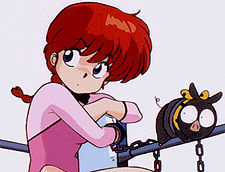
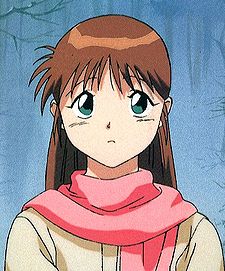
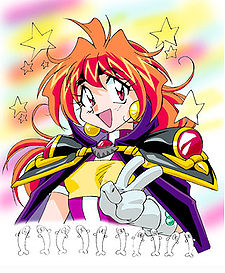

Anime series
- [1986] Maison Ikkoku - Various small roles
- [1987] City Hunter - Moriwaki Misuzu
- [1987] Esper Mami - Sanae Shimazu
- [1988] Mashin Hero Wataru - Shinobibe Himiko
- [1988] Osomatsu-kun - Todomatsu
- [1989] Alfred J. Kwak - Alfred
- [1989] Ariel - Kishida Kazumi
- [1989] Garaga - Kina
- [1989] Ranma ½ - Saotome Ranma (female version)
- [1989] Patlabor: The TV Series - Sakurayama Momoko
- [1990] Samurai Pizza Cats - Chomoranma #1/2
- [1990] Tensai Bakabon - Bakabon
- [1991] Cho-Bakumatsu Shounen Seiki Takamaru - Arusaemon Yumega
- [1991] Izumo - Nabi
- [1991] Kinkyu Hasshin Saver Kids - Seira
- [1991] Mahou no Princess Micky Momo - Micky Momo
- [1992] Yu Yu Hakusho - Young Genkai
- [1992] Yawara! - Suzuki Takeyuki
- [1993] Hakkenden Shin Sho - Inusaka Mouya
- [1994] Bounty Dog - Uzuki Shoko
- [1994] Blue Seed - Fujimiya Momiji
- [1994] Nanatsu no Umi no Tiko - Nanami
- [1994] DNA² - Saeki Tomoko
- [1995] Slayers - Lina Inverse
- [1995] Shin Seiki Evangelion - Ayanami Rei, Ikari Yui, and Pen Pen
- [1995] Dragon Ball Z - Young Blind Boy
- [1996] Soreyuke! Uchuu Senkan Yamamoto Yoko - Midou Madoka
- [1996] Saber Marionette J - Lime
- [1996] Bakuretsu Hunters - Tira Misu
- [1996] Meitantei Conan - Haibara Ai, Miyano Shiho/Sherry
- [1996] Slayers Next - Lina Inverse
- [1996] Black Jack - Fujinami Rie
- [1997] Lost Universe - Canal Vorfeed
- [1997] Jungle de Ikou - Ongo
- [1997] Pokémon - Musashi, Fushigidane, Pigeon
- [1997] Slayers Try - Lina Inverse
- [1998] All Purpose Cultural Cat-Girl Nuku Nuku DASH! - Natsume Atsuko (aka Nuku Nuku)
- [1998] Saber Marionette J to X - Lime
- [1998] Cyber Team in Akihabara - Otorii Tsubame
- [1998] Shadow Skill - Elle Lagu
- [1999] Cowboy Bebop - Faye Valentine
- [1999] Rerere no Tensai Bakabon - Bakabon
- [2000] Love Hina - Urashima Haruka
- [2000] Boys Be... - Chiharu
- [2002] Tenshi na Konamaiki - Amatsuka Megumi
- [2003] Shaman King - 'Kyoyama Anna
- [2003] Hitsuji no Uta - Koujou Chisana
- [2004] All Purpose Cultural Cat Girl Nuku Nuku - Natsume Atsuko (aka Nuku Nuku)
- [2008] Slayers Evolution - Lina Inverse
- [2009] Slayers Evolution-R - Lina Inverse
OVAs
- [1987] Bubblegum Crisis - Nam (episode 5)
- [1989] Riding Bean (ライディング・ビーン) - Carrie
- [1989] Megazone 23 III (メガゾーン23) - Dominick
- [1989] Mobile Suit Gundam 0080: War in the Pocket - Christina 'Chris' MacKenzie
- [1991] 3×3 Eyes - Pai
- [1992] Video Girl Ai - Amano Ai
- [1992] All Purpose Cultural Cat Girl Nuku Nuku - Natsume Atsuko (aka Nuku Nuku)
- [1994] Macross Plus - Lucy MacMillan
- [1995] Shadow Skill - Ella Lagu
- [1995] 3×3 Eyes Seima Densetsu - Pai
- [1997] Bakuretsu Hunters - Tira Misu
- [1998] Lupin III: Memories of the Flame, Tokyo Crisis - Maria
- [1998] Queen Emeraldas - Hiroshi Umino
- [2000] Love Hina Christmas Special: Silent Eve - Urashima Haruka
- [2001] Love Hina Spring Special - Urashima Haruka
- [2001] Love Hina Advance - Urashima Haruka
- [2002] Love Hina Again - Urashima Haruka
Motion pictures
- [1986] Project A-ko - Ume
- [1986] Castle in the Sky - Minor roles
- [1990] Kido Keisatsu Patlabor: The Movie - Weather forecaster
- [1994] Bishoujo Senshi Sailor Moon S: The Movie - Nayotake Himeko
- [1994] Heisei Tanuki Gassen Ponpoko - Sasuke
- [1995] Slayers: The Motion Picture - Lina Inverse
- [1996] Tenchi Muyo! In Love - Achika
- [1996] Slayers Special - Lina Inverse
- [1996] Slayers Return - Lina Inverse
- [1997] Evangelion: Death and Rebirth - Ayanami Rei, Ikari Yui, and Pen Pen
- [1997] The End of Evangelion - Ayanami Rei, Ikari Yui
- [1997] Slayers Great - Lina Inverse
- [1998] Love & Pop - Robot voice
- [1998] Martian Successor Nadesico: Prince of Darkness - Hisagon
- [1998] Pokémon: Pickachu's Summer Vacation - Fushigidane
- [2000] Juvenile - Female researcher, Voice of Tetra
- [2000] Vampire Hunter D - Leila
- [2000] Shiki-Jitsu - Woman
- [2001] Cowboy Bebop: Knockin' on Heaven's Door - Faye Valentine
Video games
- [1994] Lunar: Eternal Blue - Lemina Ausa
- [1998] Shinseiki Evangelion: Koutetsu no Girlfriend - Ayanami Rei, Kirishima Mana
- [2003] Drakengard - Antoshu
Dubbing
- [1988] Bright Lights, Big City - Amanda
- [1988] Full House - Aaron Bailey
- [1990] Tiny Toon Adventures - Li'l Sneezer
- [1991] My Girl - Thomas James Sennett
- [1994] The Santa Clause - Mary
- [1994] Star Trek: The Next Generation - René Picard
- [1994] True Lies - Dana Tasker
- [1996] Scream - Casey Becker
- [2000] My Dog Skip - Willie Morris
- [2001] Amélie - Amélie Poulain
- [2006] Chaotic - Takinom
External Links
| |||||||||||||||||||||||
